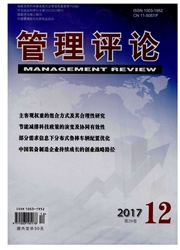

 中文摘要:
中文摘要:
如何最大程度地降低高管离职倾向,防止“散伙”而导致的新创企业解体,已经成为学术界和业界共同关注的课题。基于此,本文引入人际信任为中介变量,构建创业团队的组织特征与团队成员离职倾向的关系模型。选取创业时间在8年以下的新创企业中高层管理者作为调研对象,以实地调研获取的一手数据为依据。结果显示创业团队的组织特征均与成员离职倾向之间存在显著的负相关关系,但是与认知信任和情感信任之间存在显著的正相关关系。创业团队成员间认知信任与成员离职倾向之间存在显著的负相关关系,认知信任在创业团队的组织特征与成员离职倾向之间存在中介作用。最后,本文还结合中国特定的传统文化背景,指出关注新创企业创业团队建设的三大关键任务:创业团队的组织特征相似性和异质性关系,创业团队成员间人际信任关系的演化路径,高管成员离职倾向的内在形成机理。
 英文摘要:
英文摘要:
In order to shed new light on the academic and practical hot topic of how to reduce top management ' turnover intention and how to prevent new ventures from being split up by top management' breakup, this paper introduces interpersonal trust as a mediating variable and constructs a relation model of entrepreneurial teams' organizational characteristics and the employees' turnover intentions. We take upper- and mid-level managers in new ventures less than 8 years old as samples and use all the data from field investigation. The findings show that entrepreneurial teams' organizational characteristics have a significant negative correlation with the employees' turn- over intentions, and they all have significant positive correlation with both the employees' cognition-based trust and affect-based trust. Entrepreneurial team members' cognition-based trust has a significant negative correlation with the employees' turnover intentions, and cognition-based trust plays a mediating role between entrepreneurial teams' organizational characteristics and the employees' turnover in- tentions. At last, combining with the traditional culture of Chinese specific background, this paper also points out three ways to focus on the construction of entrepreneurial teams in new ventures : the relationships between entrepreneurial teams' organizational characteris- tics' similarity and heterogeneity, the evolutionary path of entrepreneurial team members' interpersonal trust relationships, and the in- herent formation mechanism of top management' turnover intentions.
 同期刊论文项目
同期刊论文项目
 同项目期刊论文
同项目期刊论文
 期刊信息
期刊信息
